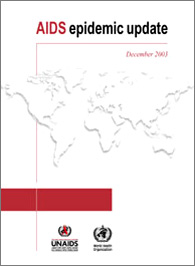The latest AIDS epidemic update has highlighted that "sex between men remains an important aspect of the epidemic in most high-income countries" as male-to-male sex is the most common mode of HIV transmission in Germany, Greece and the Netherlands with Australia and the US trailing behind. Resurgent epidemics of sexually transmitted infections (STIs), particularly syphilis, suggest to UNAIDS an increase in risky sexual behaviour amongst gay men.

The 2003 report also cited the resurgence of other sexually transmitted infections in Australia, Japan, Western Europe and the United States of America pointing to a revival of high-risk sexual behaviour-especially among young people including men who have sex with men.
It added: "The prevention programmes that had achieved notable success in limiting HIV transmission in the 1990s, especially among men who have sex with men, appear to have been shifted to the back burner in many high-income countries."
Syphilis outbreaks amongst gay men in France, Ireland, the Netherlands and UK; a 102 percent increase of gonorrhoea infections diagnosed at sexually transmitted infection clinics in England and Wales; and Australia's highest incidence rates for gonorrhoea among adults aged 15-39 since 1997 have suggested to the UNAIDS authors that "current prevention activities are registering poorly among the younger generation."
The report did not provide any statistics on HIV transmission rates amongst MSM in Asia.
UNAIDS estimates that a total of 1.6 million people are now living with HIV - including 80,000 who are estimated to have been infected with HIV in the last year - in the world's richest countries, including western Europe, north America, Australasia and Japan.











 Printable Version
Printable Version










Reader's Comments
Be the first to leave a comment on this page!
Please log in to use this feature.